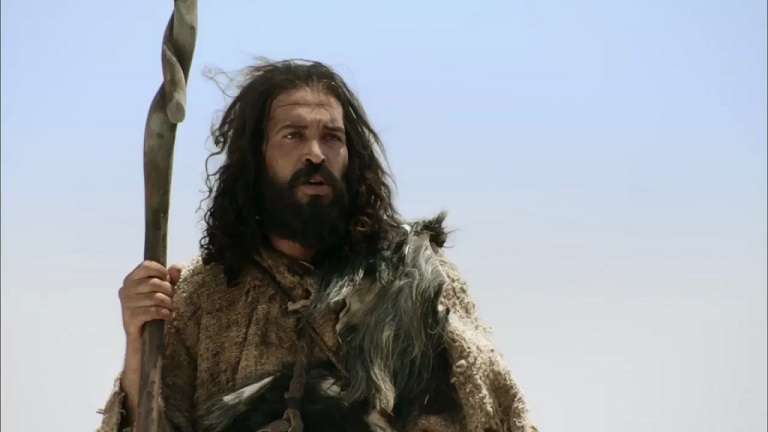
إنجيل القدّيس مرقس .29-14:6
سَمِعَ المَلِكُ هِيرُودُسُ بِيَسُوع، لأَنَّ ٱسْمَهُ صَارَ مَشْهُورًا، وكَانَ أُنَاسٌ يَقُولُون: إِنَّ يُوحَنَّا المَعْمَدانَ قَامَ مِنْ بَيْنِ الأَمْوَات، ولِذلِكَ تَجْرِي عَلَى يَدِهِ الأَعْمَالُ القَدِيرَة
وآخَرُونَ يَقُولُون: «إِنَّهُ إِيليَّا». وآخَرُونَ يَقُولُون: إِنَّهُ نَبِيٌّ كَأَحَدِ الأَنْبِيَاء
ولَمَّا سَمِعَ هِيرُودُسُ قال: إِنَّ يُوحَنَّا الَّذي قَطَعْتُ أَنا رَأْسَهُ، هُوَ نَفْسُهُ قَام
وهِيرُودُسُ هذَا كانَ قَدْ أَرْسَلَ فقَبَضَ علَى يُوحَنَّا وكَبَّلَهُ في السِّجْن، مِنْ أَجْلِ هِيرُودِيَّا ٱمْرأَةِ أَخِيهِ فِيلِبُّس، وكانَ قَدْ تزَوَّجَها؛
لأَنَّ يُوحَنَّا كانَ يَقُولُ لَهُ: لا يَحِلُّ لَكَ أَنْ تتَزَوَّجَ ٱمْرَأَةَ أَخِيك
وكانَتْ هِيرُودِيَّا ناقِمَةً عَلَيْهِ تُرِيدُ قَتْلَهُ فلا تَسْتَطِيع؛
لأَنَّ هِيرُودُسَ كانَ يَهَابُ يُوحَنَّا، لِعِلْمِهِ أَنَّهُ رجُلٌ بارٌّ قِدِّيس. وكانَ يُحَافِظُ عَلَيْه، ويَحْتَارُ جِدًّا عِنْدَما يَسْتَمِعُ إِلَيْه، لكِنَّهُ كانَ يَسْتَمِعُ إِلَيْهِ بِٱرْتِيَاح
وكانَ يَوْمٌ مُوَافِق، عِنْدَما أَقَامَ هِيرُودُس، في ذِكْرَى مَوْلِدِهِ، عَشَاءً لِعُظَمَائِهِ وقُوَّادِهِ وأَعْيَانِ الجَلِيل
ودَخَلَتِ ٱبْنَةُ هِيرُودِيَّا ورَقَصَتْ فأَعْجَبَتْ هِيرُودُسَ والمُتَّكِئِينَ مَعَهُ. فقَالَ المَلِكُ لِلْصَّبِيَّة: أُطْلُبِي مِنِّي كُلَّ ما تُرِيدِينَ فَأُعْطِيَكِ إِيَّاه
وحَلَفَ لَهَا: أُعْطِيكِ كُلَّ مَا تَطْلُبِين، ولَو نِصْفَ مَمْلَكَتي
فخَرَجَتْ وقَالَتْ لأُمِّها: «ماذَا أَطْلُب؟». فقَالَتْ: رَأْسَ يُوحَنَّا المَعْمَدَان
وفي الحَالِ دَخَلَتْ مُسْرِعةً إِلى المَلِكِ وطَلَبَتْ قَائِلَة: «أُرِيدُ أَنْ تُعْطِيَني حَالاً عَلَى طَبَقٍ رأْسَ يُوحَنَّا المَعْمَدَان
فٱغْتَمَّ المَلِكُ جِدًّا. ولكِنْ مِنْ أَجْلِ القَسَمِ والمُتَّكِئِينَ لَمْ يَشَأْ أَنْ يَرُدَّ طَلَبَها
وفي الحَالِ أَرْسَلَ المَلِكُ سَيَّافًا، وأَمَرَهُ أَنْ يَحْمِلَ إِلَيْهِ رأْسَ يُوحَنَّا. فذَهَبَ السَّيَّافُ وقَطَعَ رَأْسَ يُوحَنَّا في السِّجْن
وحَمَلَ الرَّأْسَ عَلَى طَبَق، وأَعْطَاهُ لِلصَّبِيَّة، والصَّبِيَّةُ أَعْطَتْهُ لأُمِّها
وسَمِعَ تلامِيذُ يُوحَنَّا بِٱلخَبَرِ فذَهَبُوا ورَفَعُوا جُثْمَانَهُ، ووَضَعُوهُ في قَبْر
Holy Gospel of Jesus Christ according to Saint Mark 6:17-29.
Herod was the one who had John arrested and bound in prison on account of Herodias, the wife of his brother Philip, whom he had married.
John had said to Herod, “It is not lawful for you to have your brother’s wife.”
Herodias harbored a grudge against him and wanted to kill him but was unable to do so.
Herod feared John, knowing him to be a righteous and holy man, and kept him in custody. When he heard him speak he was very much perplexed, yet he liked to listen to him.
She had an opportunity one day when Herod, on his birthday, gave a banquet for his courtiers, his military officers, and the leading men of Galilee.
Herodias’s own daughter came in and performed a dance that delighted Herod and his guests. The king said to the girl, “Ask of me whatever you wish and I will grant it to you.”
He even swore (many things) to her, “I will grant you whatever you ask of me, even to half of my kingdom.”
She went out and said to her mother, “What shall I ask for?” She replied, “The head of John the Baptist.”
The girl hurried back to the king’s presence and made her request, “I want you to give me at once on a platter the head of John the Baptist.”
The king was deeply distressed, but because of his oaths and the guests he did not wish to break his word to her.
So he promptly dispatched an executioner with orders to bring back his head. He went off and beheaded him in the prison.
He brought in the head on a platter and gave it to the girl. The girl in turn gave it to her mother.
When his disciples heard about it, they came and took his body and laid it in a tomb.